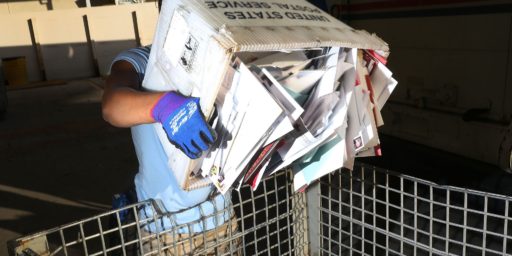Military Ballots Still Unfixed
WSJ — Military Ballots Still Unfixed [$]
During the Florida recount turmoil in 2000, George W. Bush maneuvered in court to force Florida officials to tally military ballots that arrived late or mislabeled. Those ballots pumped up Mr. Bush’s slim lead in the recount.
Nearly four years later — and less than five months before the general election — the system for military balloting hasn’t improved in any major way. In fact, the matter is in some ways more complicated — and more sensitive — because President Bush has deployed tens of thousands of additional troops in Afghanistan and Iraq.
“We’ve got to do something,” says Sen. Christopher Bond. The Missouri Republican is one of several Republicans demanding that the Pentagon take action to keep troops from being disenfranchised. Doing so could have an added benefit: Active military personnel — as well as veterans — generally lean Republican, though Mr. Bush may be straining morale among some soldiers with his extended deployments in Iraq. “The people who are defending our freedom ought to be able to vote on how we exercise our freedom,” Mr. Bond says.
While the 2000 election showed how the mechanics of balloting can influence the outcome, the push to improve military balloting shines a spotlight on just how slowly the gears of change can turn.
In the middle of the post-election drama four years ago, then-Defense Secretary William Cohen ordered a review of the military mail system, which has been plagued with delays and other problems for at least a decade. This spring, the General Accounting Office, the investigative arm of Congress, concluded that the Pentagon’s postal system is so flawed that “the timeliness of mail delivery to troops serving in Operation Iraqi Freedom cannot be accurately assessed.”
It’s not just slow. In many cases, the GAO could not verify that letters had been delivered at all. For the 2004 campaign, that means the votes of many of the soldiers, sailors and airmen serving overseas may not be counted. And that overseas number has jumped by about 100,000 since 2000, to nearly 330,000, says Dan Goure, a national-security expert at the Lexington Institute, a nonpartisan think tank.
Amazing.
The rest of the article:
“The priority of acting on lessons learned seems to have faded over time,” says George Terwilliger, a Bush lawyer in 2000 who was deputy attorney general during the administration of President Bush’s father.
While the Pentagon hasn’t turned a blind eye to the problem of delivering ballots, its solution falls far short of the electronic system that, until recently, was widely discussed. In January, the Pentagon pulled the plug on a $22 million plan to let some 100,000 troops and civilians overseas vote over the Internet, citing concerns that the system wasn’t secure enough to prevent vote tampering.
Instead, the Pentagon and U.S. Postal Service announced a joint project to deliver absentee ballots. Officials promise to ensure that each ballot gets a proper postmark, is sorted correctly and moved quickly to and from more than 3,000 county election offices across the U.S., even those sent from remote locations in the Middle East. Late-arriving ballots will be shipped overnight from U.S.-based distribution centers to local election offices.
“Simply put, it’s a low-tech solution,” says Paul Vogel, an official at the U.S. Postal Service.
The approach draws faint praise from lawmakers who have been pressing the Pentagon to improve military mail delivery. “A step in the right direction,” says Rep. Randy Forbes, a Republican whose district in southeast Virginia is home to Fort Lee, an Army base with nearly 4,000 soldiers, and borders the Norfolk naval shipyards. “But in the long term, it’s just a Band-Aid on a bigger problem.”
Mr. Forbes and others worry that the Pentagon plan fails to address longstanding problems, not the least of which is delivering the mail. As part of the GAO study, more than 1,700 “test letters” were sent through the military system to individuals in Kuwait, Bahrain and Iraq, but the agency could confirm that only 59% were actually received. Moreover, the GAO found wide dissatisfaction with mail service in interviews with more than 125 soldiers and Marines. In some cases, soldiers complained that packages arrived in the Iraqi theater only after being routed through U.S. installations.
Charles Abell, the deputy undersecretary of defense for personnel and readiness, said the Pentagon is committed to making sure that soldiers and their families “can vote and have their votes properly counted.” He vows to continue to “look at the entire process, find impediments, resolve those impediments.”
But Sen. Bond says he hasn’t found Pentagon officials particularly eager to act or even to acknowledge the problem. “We have encountered a ‘Pentagon process,’ ” he says. “I know they have to go through a lot of hoops, but I would hope that … we could encourage them to move quickly.”
Solutions aren’t easy. With Internet balloting on indefinite hold, some officials in the administration and on Capitol Hill are weighing technology currently being developed for the Postal Service that electronically tracks each piece of mail. But the system would require a central database of the latest postings of all personnel, something the Pentagon doesn’t have. Near term, some lawmakers suggest the Pentagon simply assign a top general — someone with enough bureaucracy-busting clout — to make the system work before voting begins this fall.
Some legal maneuvering by the Justice Department is adding urgency to the situation. During the primary season, the department’s Civil Rights Division secured court actions in Pennsylvania and Alabama extending the time allowed for counting absentee ballots from overseas.
The department’s proactive stance reflects sensitivity to Florida’s problems four years ago. It isn’t clear what impact the legal actions will have, but the readiness to act early appears to open the door for delayed vote counting this fall.
With the stakes rising, House Speaker Dennis Hastert, the Illinois Republican, is joining efforts to pressure the Pentagon to move more rapidly. “We want the mail to get there,” says John Feehery, Mr. Hastert’s press secretary. “First of all, for morale. Second of all, for absentee ballots.”





